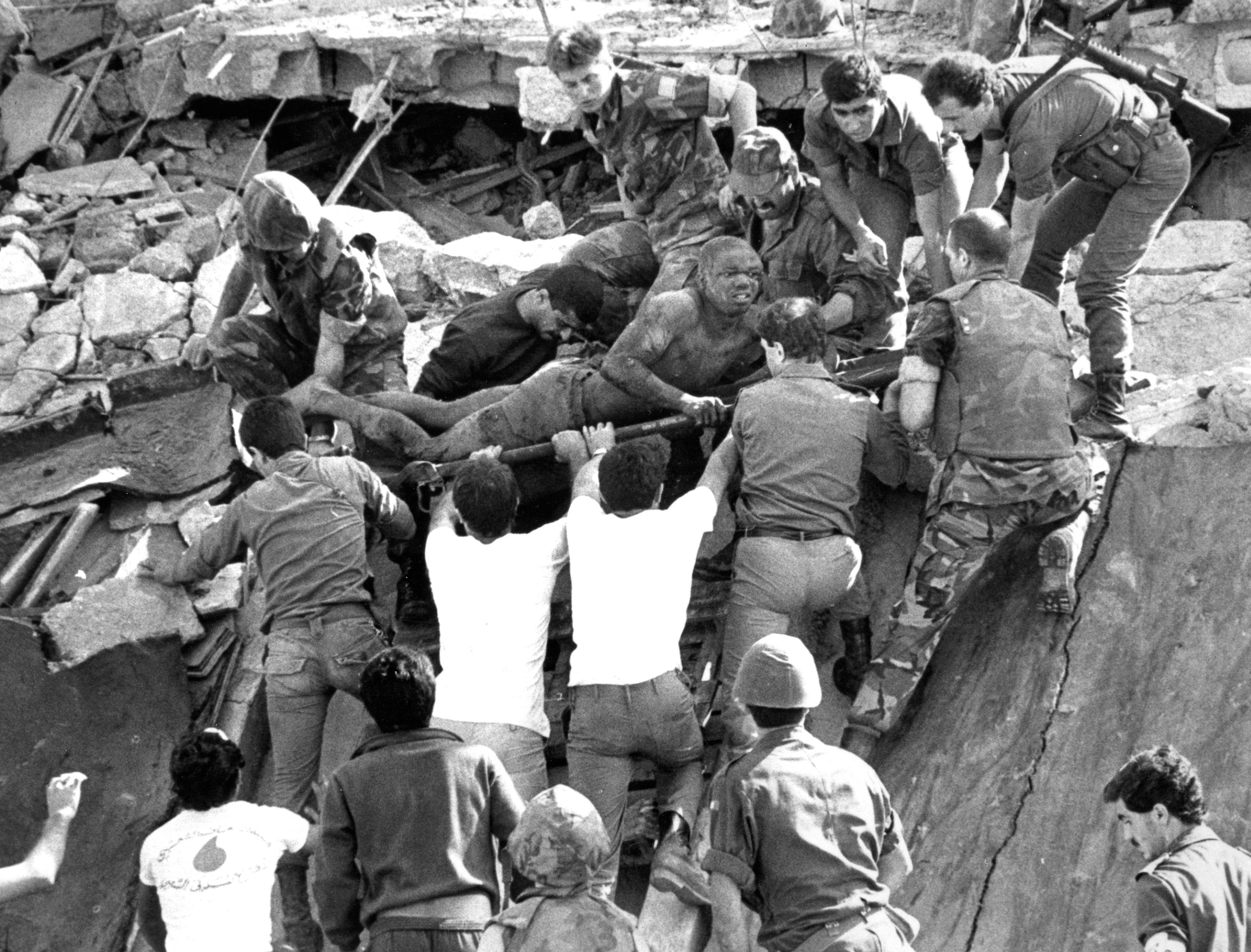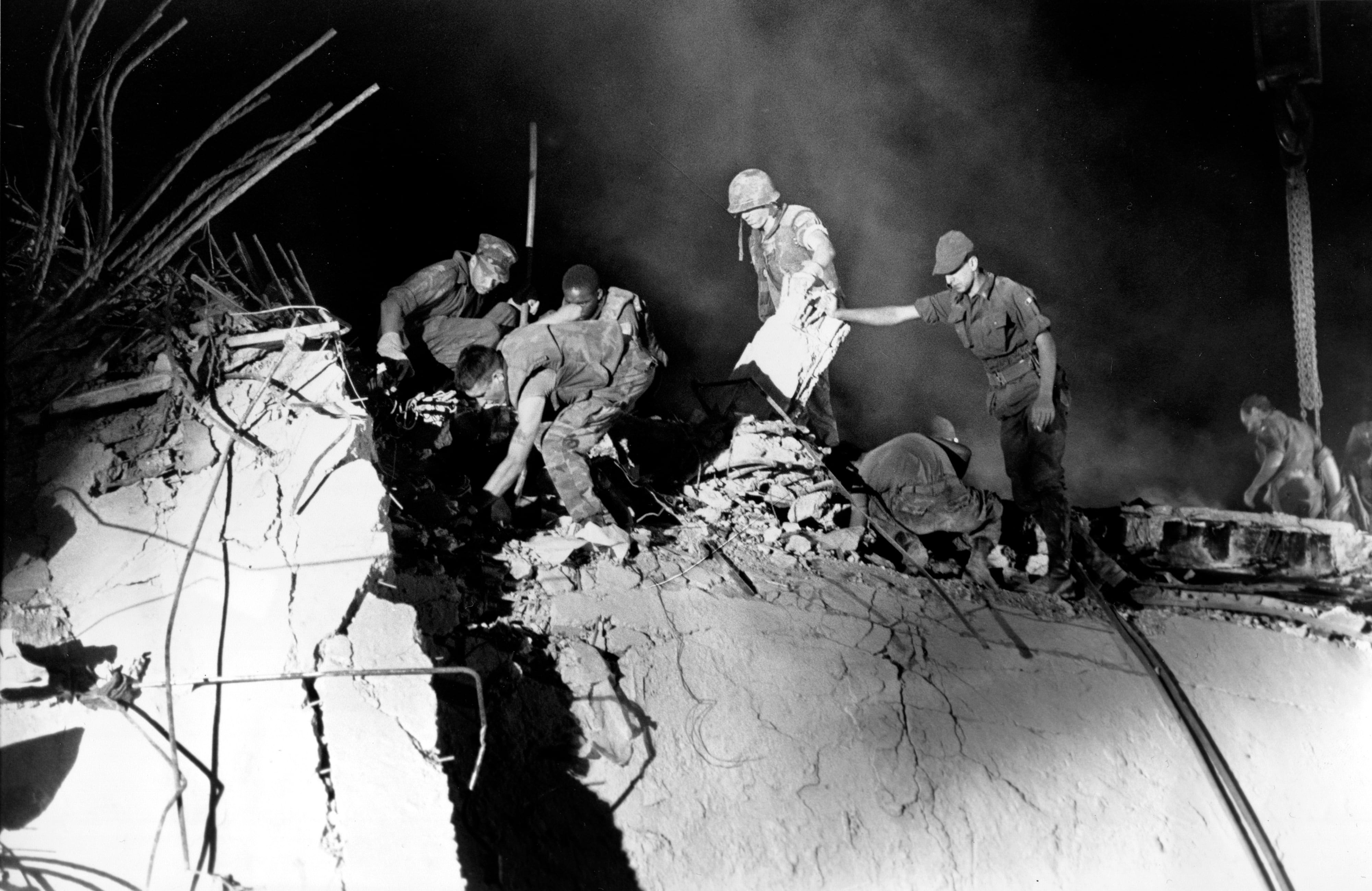Forty-one years in the past right this moment, a Hezbollah affiliate rammed his yellow Mercedes stake-bed truck by a chest-high concertina wire fence on the Marine barracks in Beirut, Lebanon, detonating a lethal payload that killed 220 Marines, 18 sailors and three troopers.
To this present day, that occasion stays the most important lack of life the Marine Corps has suffered for the reason that Battle of Iwo Jima in World Battle II.
A brand new e-book on the bombing argues that it was additionally a gap salvo within the decades-long combat between the US and Center East terrorist organizations. The truck driver was later discovered to have hyperlinks to Hezbollah, the Iran-backed, armed wing of the Lebanese Shiite Muslim political occasion.
Hezbollah has largely operated as an off-the-cuff arm for Tehran for years, and is now in battle with Israel in Lebanon.
How the Beirut bombing has echoed by many years of American international coverage frames the central thesis of “Focused: Beirut: The 1983 Marine Barracks Bombing and the Untold Origin Story of the Battle on Terror.”
Former Navy SEAL sniper turned New York Occasions bestselling writer Jack Carr, creator of quite a few military-political thriller novels, co-wrote the e-book with James M. Scott, a Pulitzer Prize finalist and nonfiction author, producing a piece that examines the barracks bombing and its reverberations by the years.
Each males talked with Navy Occasions forward of the publication of the e-book, which is now out there, sharing a few of what they remembered themselves and what they discovered within the analysis and writing.
This interview has been edited for size and magnificence.
Navy Occasions: This bombing occurred greater than 40 years in the past, do both of you keep in mind when and the way you discovered about this occasion?
Jack Carr: I used to be very conscious of this as I used to be already on a path to becoming a member of the navy. I devoured something I may discover, particularly on terrorism. I keep in mind the Time and Newsweek journal covers on our eating room desk. I most likely nonetheless have them in a field someplace.
James M. Scott: I distinctly keep in mind when this occurred. I keep in mind coming house from college and my mother telling me that it had occurred. This additionally occurred the identical week because the Grenada invasion. It was big information. My mother and father had been within the Navy. I keep in mind worrying if the US was going to finish up struggle once more?
MT: Mr. Carr, you could have a fiction background whereas Mr. Scott is a nonfiction author, what introduced the 2 of you collectively on this mission?
Carr: I prefer to weave plenty of historic occasions into my work. I at all times knew that I’d transfer into the nonfiction area, very similar to Tom Clancy did within the Eighties and Nineties. So, I started seeking to begin a sequence of books centered on terrorist occasions. I wrote down about three pages price of various terrorist occasions from the tip of World Battle II. There have been lots, sadly. However I saved coming again to Beirut as a result of it was such a turning level in our relationship with the Center East and Iran particularly, by its proxies.
Iran discovered classes by the bombing that grew to become nearly the mannequin for every thing they did afterward. I instructed Simon and Schuster I need to work with somebody and there’s just one particular person I need to work with, it’s this man James Scott. I’ve all his books and I really like his work. My editor and agent had a connection, and we began speaking on a Zoom name, which kicked issues off and we’ve grow to be associates all through this course of.
Scott: When he reached out it was so serendipitous. I’d watched the TV present “The Terminal Record,” primarily based off Jack’s books. Then I get this e-mail in regards to the Beirut mission. At about that very same time I used to be going to this convention on World Battle II historical past and one of many guys there was a former director of the Marine Corps Historical past Division. I instructed him about this new Beirut mission, and he stated the Marine Corps archives have all these oral histories of Marines who skilled the incident or had been in command at totally different ranges on the time of the bombing. I assumed, that is simply meant to be.

MT: What are a number of the stuff you discovered whereas researching and drafting the e-book?
Carr: What I didn’t notice on the time this occurred in October 1983 is all of the issues that led to the occasion, beginning in April. Most individuals are conscious that one thing occurred in Beirut within the Eighties. They’re often serious about the barracks bombing in October. However should you perceive that there was a bombing on the U.S. embassy in April 1983, and that on the time the servicemembers there have been peacekeepers. We did lose troops over the summer time; they had been in fight lengthy earlier than the barracks bombing.
Scott: I believe top-of-the-line traces that sums up Beirut is from Col. Timothy Geraghty, commander of the twenty fourth Marine Amphibious Unit on the time.
He stated, “In the course of the time they had been there the state of affairs modified however nobody modified the state of affairs.” I believe that sentence encapsulates greater than something what occurred to the fellows over there. The Marines landed in Beirut in 1982 as a stabilizing pressure. The concept is that if the People are there as a peacekeeping pressure together with the French, Italians and British, that we are able to present some kind of stability.
However over time, that peace erodes, the infighting begins once more between the separate teams and, basically, there’s a civil struggle. So, you see the state of affairs begins sliding over the summer time. Iran sees this chance to return in and capitalize off the chaos, ship revolutionary guardsmen to create terror coaching camps and an infrastructure. The fellows on the bottom in Beirut, they see what’s happening proper exterior the wire. Nevertheless it takes lots longer for Washington to catch as much as the truth of what’s happening over there.

MT: What ought to servicemembers right this moment perceive in regards to the bombing and its results on U.S. coverage and navy engagements within the Center East?
Carr: There was plenty of powerful speak from the presidential administration within the direct aftermath of the bombing. After which we slowly and quietly basically go away in early 1984 and that teaches Iran that, one, proxies work, and two, they’ll get the outcome they need through the use of proxies and through the use of terrorism and a spectacular occasion. That’s to explain an occasion that pulls the lens of the world media. So, this actually grew to become the mannequin for Iran going ahead.
Scott: I’d say that it’s not simply this occasion however for historical past on the whole, it’s our obligation as residents to review historical past. Sure, there are classes right here for operational and tactical ranges. However now that this occasion is humanized, we have to be certain that individuals in energy perceive the character of the battle through which they’re partaking earlier than committing U.S. forces.
Todd South has written about crime, courts, authorities and the navy for a number of publications since 2004 and was named a 2014 Pulitzer finalist for a co-written mission on witness intimidation. Todd is a Marine veteran of the Iraq Battle.





















